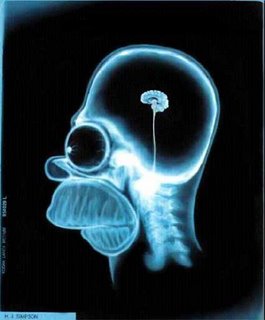Thursday, September 28, 2006

The documentary regarding brain activity during praying/meditation raises some questions about the validity of these scientists' construct of "god moments". Who is to say that these random images triggered in the minds of the participants are not subconscious snippets of their lives? During sleep, our brain takes distinct images and memories from our past day, week, year, whatever; jumbles them up, connects them in bizarre ways; and regurgitates them into the form of a dream. If these neuropsychologists are planting nodes on their guinea pigs subjects in an attempt to trigger "god moments" within them, they are probably likelier to provoke images and memories already existent in their memories (thus, analogous to a dream); exaggerated and inflated caricatures of them, no less. The skeptic/rationalist/voice of reason in me does not believe in the ability of these people to experience transcendent "god moments" within the realms of a laboratory.
And to look at the grand scheme of spirituality & technology, so what if hypothetically this neuroscience does suddenly allow us to package transcendent emotions in a bottle? Issues in society lie much deeper than the distinctive emotions of individuals; this pursue of "emotions in a pill" seems much too reflective of our individualistic culture and parallel to a "quick fix".
Regarding Coupland's novels - they do indeed hit home in terms of this course, in that they tend to have themes of seeking answers coupled with somewhat modern circumstances. That sounds pretty vague, but one example is Microserfs. Not a bad read.
B
And to look at the grand scheme of spirituality & technology, so what if hypothetically this neuroscience does suddenly allow us to package transcendent emotions in a bottle? Issues in society lie much deeper than the distinctive emotions of individuals; this pursue of "emotions in a pill" seems much too reflective of our individualistic culture and parallel to a "quick fix".
Regarding Coupland's novels - they do indeed hit home in terms of this course, in that they tend to have themes of seeking answers coupled with somewhat modern circumstances. That sounds pretty vague, but one example is Microserfs. Not a bad read.
B